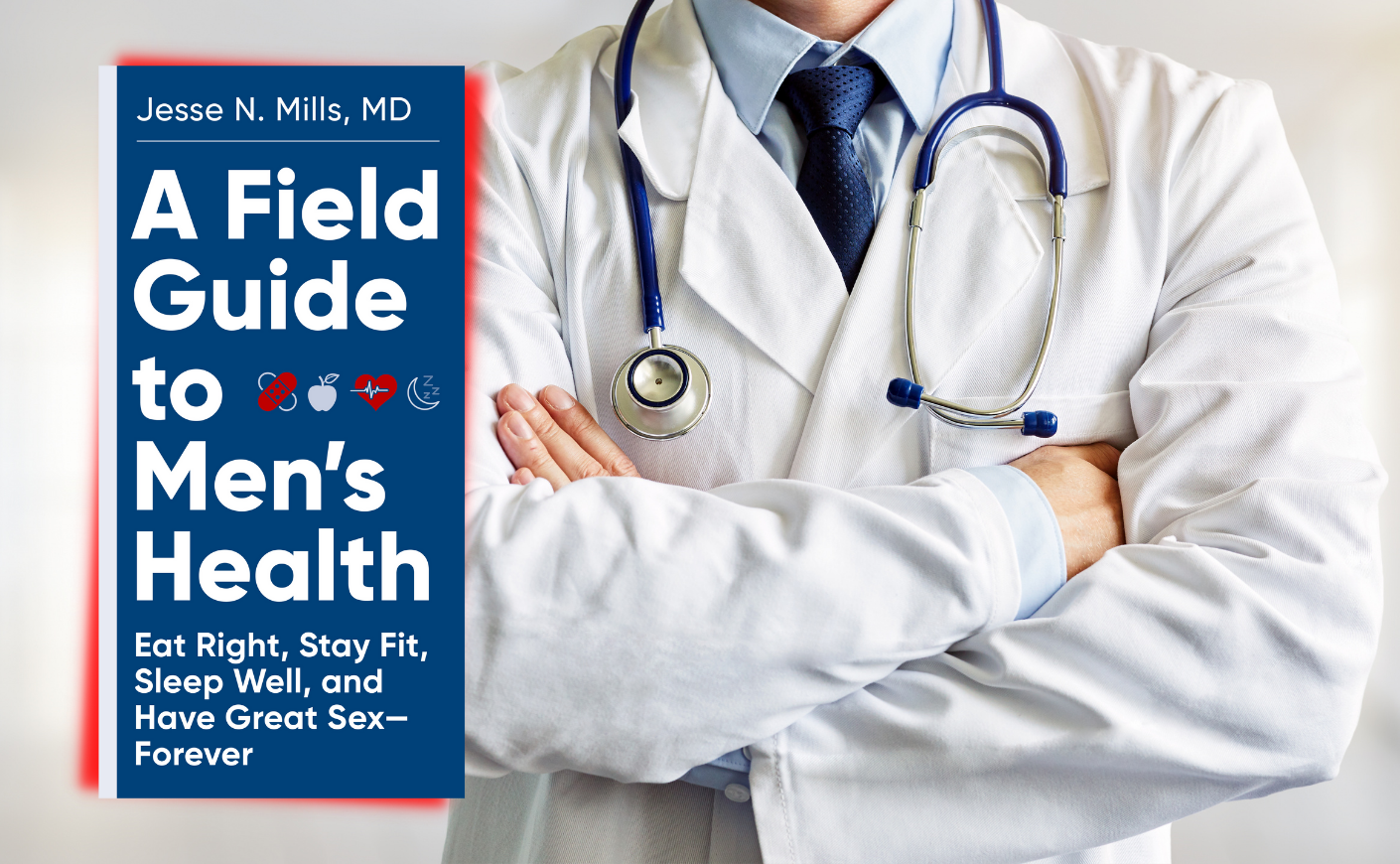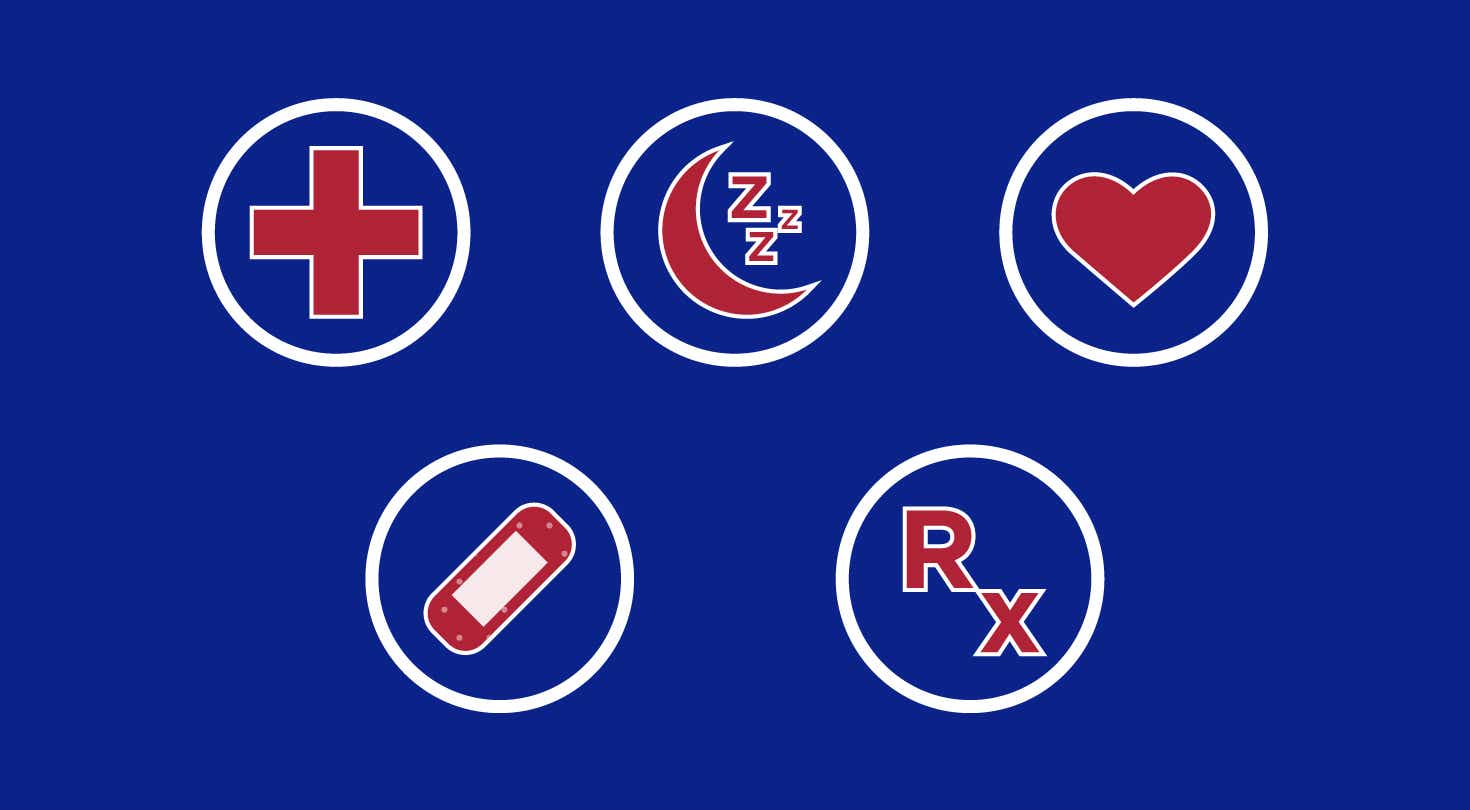It’s commonly accepted wisdom that many men avoid physicians at all costs, and Jesse Mills, MD, knows that firsthand: “Men typically don’t want to go to the doctor unless a bone is broken — or something’s wrong with the penis.”
As the director of UCLA’s Men’s Clinic and a health specialist for the Lakers and the Dodgers, Dr. Mills has years of experience treating men — and he knows when he’s not treating them, too. Unlike women, who have annual needs from a young age for birth control and pap smears, men don’t have any absolutely necessary routine screenings until much later, which creates a long gap when many of them don’t see a doctor at all unless they have a serious problem.
“You're a kid at 18 when you take your last sports physical, then you're out into the wasteland until you start getting your prostate check and your colonoscopy,” Dr. Mills says.
But he wants to change that, which is why he’s written A Field Guide to Men's Health: Eat Right, Stay Fit, Sleep Well, and Have Great Sex―Forever. It’s an all-inclusive guide to the male body, all the things that can go haywire, and how to make them better.
And today, he’s giving us a thorough check-up by answering these burning questions about men’s health from the readers of Wake-Up Call!
"My triplet sons turn 26 this year, and none of them have a primary care doctor. What baseline tests or blood work should they be getting?"
Dr. Jesse Mills: One of my professional organizations, the American Urological Association, came up with what we call a men’s health checklist by decade. So guys in their 20s should know their blood pressure and their resting heart rate, and they should be able to perform a testicular self-exam. It’s very easy to know how to do a good testicular exam, and they should be doing that once a month. Lastly, it's a great idea to get their cholesterol levels checked to know what their baseline is, and then you can intervene if necessary. So it would be great for those triplets to go to a doctor — and they could all go to the same one and confuse each other.
"What testing or exams should a 55-year-old man have if he begins to experience erectile dysfunction?"
I’d start with a good interview. Is he totally unable to achieve an erection, or is it just not as strong as it used to be or doesn’t last as long as it used to? And one question I ask every man who walks into my office is: Are you still getting up in the morning with erections? That’s a very good indication of overall men’s health. We know that for an erection to happen, a guy has to have a good cardiovascular system, a good hormonal system, a good nervous system, and a good psychological system.
The physical exam is pretty straightforward. I’d check his heart. I’d check if his testicles are healthy. And at 55, that’s when he should start getting a prostate exam. Then we move into the bloodwork. I’d want to know his cholesterol and blood sugar levels. I would check his testosterone level. I’ll occasionally do an ultrasound of the penis, if I find anything on the physical exam that I’m concerned with, like scar tissue that could be a sign of a condition called Peyronie’s disease, which can lead to difficulties with erections.
I don’t want to miss anything because if men in their 50s or younger are having erectile dysfunction, there’s a very good chance he may have an underlying cardiovascular disease that hasn’t manifested itself yet. The artery that supplies the penis with an erection is a little bit smaller than the artery that supplies the heart. So if you have a problem like cholesterol, which affects arteries everywhere, then the smaller the pipe, the quicker you’re going to have a problem. So if a guy has erectile dysfunction in that pipe, it could be that his coronaries or his brain aren't too many years behind having a problem themselves.
"What are the treatment options for erectile dysfunction?"
The little blue pill is still an amazingly well-prescribed drug. Viagra has been around since 1998, and it's generic, so they can go to their local superstore and get it for about 20 cents a pill. That's still my first-line therapy for anybody, but it doesn't work for everyone, so there are other options. One of the main things I do surgically is what's called a penile implant, which is kind of like getting a knee replacement. We make a small incision into the penis and insert two cylinders that inflate with saltwater. I hook it up to a reservoir and put a little pump in the scrotum, so every time he wants to have sex, he just pumps this little device, and magically his penis comes to life. It’s a great way to restore intimacy in men who have no other options that work conservatively.
"My husband snores like crazy and often chokes himself awake. His health is my top priority, but being able to sleep in the same room again would be great, too! Any advice for my stubborn guy?"
Snoring is often a sign of something much more serious that guys definitely need to figure out how to correct. We know that snoring is associated with sleep apnea, and if you’re hearing your partner snore, then stop breathing and cough about five seconds later, that’s an apneic episode. That leads to a lot of bad things. And if you’re snoring, that means you’re not actually in deep sleep.
It could be that their tonsils are big, or they're not sleeping in a humidified enough environment. It could be obesity. The biggest cause of snoring is that you've just got too much weight, both on your upper airway as well as compressing deeper in your chest. The other thing is people eat and drink alcohol too late, and both of those things are associated with not only snoring but also getting reflux.
So, snoring is worth a visit to the doctor alone. You shouldn’t just kick your partner to the guest bedroom so you can sleep better. You have to intervene and get them to see a physician.

"What are the early symptoms of prostate cancer?"
There are none. That’s the thing about prostate cancer: It’s such an insidious, slow-growing cancer that you usually don’t get symptoms until it’s too late. So early detection is important, and we've been doing that very effectively since the early 1990s. There's a blood test called a PSA, or prostate specific antigen, and then there's a physical exam where the primary doctor or urologist will perform a rectal examination. Those two things are the first step in keeping guys safe from prostate cancer. We typically recommend starting somewhere between the ages of 45 and 55, depending on risk factors and family history. If we catch it early, there’s a lot we can do.
"My three sons, ages 37, 40, and 43, are hearing different responses from doctors about when to have their first colonoscopy. Thoughts?"
The American Cancer Society did change the recommendation for colon cancer screening within the last couple of years. It used to be that you’d get your first colonoscopy at 50 unless you had a very strong family history of colon cancer, then they would back that up at least five, if not 10 years. And then, unfortunately, we lost Chadwick Boseman. He was a guy in his 40s who had metastatic colon cancer before anybody caught it. And sadly, there are also lots of people who aren’t famous who are dying of colon cancer at an earlier age. We don't really know why, so with that in mind, the current recommendations are to begin colon cancer screening at 45. And if that first screen looks great, then you don’t have to get another one for 10 years.
"Why is my husband so resistant to getting hearing aids, even with an audiologist's recommendation?"
Unfortunately, one of the biggest signs of aging is to have that little thing sticking out of your ear. People think, “I’m officially old if I need a hearing aid.” But hearing is incredibly important because it socially isolates you, especially now, when so much of our communication is done via Zoom. But the beautiful thing is that technology is going to win on this. Hearing aids are getting smaller and smaller and more and more discreet. And it’s a covered benefit for people over 65, so there is no excuse [not to try one].
"What’s your biggest advice for men about what they should or shouldn’t be eating?"
My nutritional elevator pitch is to eliminate processed foods and sugar from your diet entirely. If you've got to unwrap it from plastic or if there's any added sugar in it, don't eat it. If you just did that one thing, most of our health problems would get better.
But the key sentence of the nutritional chapter in my book is, “All diets fail.” My recommendation is to go with what you know you can stick with. Humans have a constant fight against the mechanisms in our brain that want to always be eating, so you have to figure out how to set your caloric threshold a little lower. So, first, don’t eat so much. No sugar, or at least as little as possible. Never add sugar to anything. Stay away from soft drinks. And fruit juice is a false friend — it’s a terrible part of the American diet. You might as well drink a can of Coke as drink orange juice without any fiber in it. It’s the same evil.
"What is the most important question more men should be asking their doctor?"
“What can I do to make my health better?” The biggest problem we see as physicians is people are still coming in looking for a shortcut. That’s where I frustrate my patients. They say, “Doc, I know I have to lose weight. What can you prescribe me?” And I say, “I can prescribe you to get off your ass and start moving 30 minutes a day.” We’re constantly thinking there has to be a product I can buy to get myself out of this mess, but the most important thing you can do for your health is to invest yourself in your care. You’re going to spend 20 minutes of your entire year in my office — maybe an hour, if I see you for a couple of follow-ups. That means you’ve got 364 days and 23 hours to take care of yourself.
The information provided on this site isn’t intended as medical advice and shouldn’t replace professional medical treatment. Consult your doctor with any serious health concerns.









